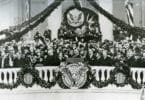Let’s continue with our Pillars of Power series. We arrive at Jimmy Carter, a president whose legacy is as unique as his journey to the White House. From his humble beginnings on a peanut farm in Georgia to his post-presidential years as a champion of humanitarian causes, Carter’s life is defined by integrity, faith, and a commitment to peace. Let’s explore his family roots, the beliefs that shaped him, and the principles that guided him as president and beyond.
Family Background: Roots of the Carters
Jimmy Carter was born on October 1, 1924, in Plains, Georgia. His family lived modestly, with his father, James Earl Carter Sr., working as a farmer and businessman. Known for his work ethic and devotion to the community, Carter Sr. raised his children to value hard work, humility, and honesty—principles that would shape Jimmy’s life and leadership.
Carter’s mother, Lillian Gordy Carter, was equally influential. A dedicated nurse known for warmth and compassion, she often provided free medical care to those in need. She instilled in Jimmy a sense of empathy and service that defined his public life. Lillian’s compassionate nature and unwavering faith left a lasting impression on Carter, who described her as one of the most important influences in his life.
The Carter family had deep Southern roots, with ancestors who had lived in Georgia for generations. They were a close-knit family with a strong sense of tradition and community—a legacy of Carter’s devotion to public service.
A Foundation of Faith and Values
Carter’s Christian faith has always been central to his identity, grounding him through his political career and personal challenges. Raised as a Baptist, he embraced a faith emphasizing service, humility, and kindness. Throughout his life, he described his faith as the guiding force behind his decisions, from his time as a Georgia state senator to his years in the Oval Office.
Carter’s commitment to his faith was not just in words but in action. He taught Sunday school even during his presidency and returned regularly to Plains to attend his home church. For Carter, faith was more than personal—it was a call to serve, to seek justice and peace in a world often marked by conflict.
This deeply held belief in service would become a defining theme of his presidency, shaping his domestic policies and approach to foreign relations.
From the Navy to the Presidency
Before his political career, Carter attended the United States Naval Academy, where he developed a strong sense of discipline and dedication to public service. After serving as a naval officer specializing in submarines, he returned to Georgia, where he took over his family’s peanut farm and eventually entered local politics. Carter’s rise was fueled by his reputation as a reformer committed to transparency and honesty.
In 1970, Carter was elected governor of Georgia, making strides toward desegregation and equal opportunity. His honest, humble style appealed to voters nationwide, and in 1976, he ran for president, promising a government that would be “as good and honest as the American people.” His message resonated, and Carter’s pledge to restore integrity to the White House won him the election.
The Carter Presidency: A Commitment to Human Rights and Peace
When Jimmy Carter took office in 1977, he brought a vision of a more compassionate and just America. Several key themes defined his presidency:
• Human Rights: Carter believed that America should lead by example, promoting freedom and dignity worldwide. His administration emphasized human rights in foreign policy, establishing the U.S. as a champion of global justice.
• Middle East Peace: Carter’s most notable foreign policy achievement was brokering peace between Egypt and Israel. The Camp David Accords of 1978, a historic breakthrough in Middle Eastern diplomacy, brought together Egyptian President Anwar Sadat and Israeli Prime Minister Menachem Begin. Carter’s dedication during these negotiations highlighted his belief in diplomacy and dialogue as tools for peace.
• Environmental Stewardship: Carter recognized the importance of energy conservation and environmental protection before his time. He promoted renewable energy sources and encouraged Americans to use energy wisely. His environmental efforts laid the groundwork for future policies focused on sustainability.
Life After the White House: A Legacy of Service
After leaving the White House, Carter’s commitment to public service continued. In 1982, he founded the Carter Center, which promotes human rights, democracy, and health worldwide. Through initiatives like election monitoring and disease prevention, the Carter Center has impacted global issues.
Carter’s dedication didn’t end there; he also volunteered extensively with Habitat for Humanity, building homes for those in need well into his 90s. His work after his presidency earned him the Nobel Peace Prize in 2002, recognizing his efforts in international conflict resolution, advancing democracy, and promoting economic and social development.
Lesser-Known Facts About Jimmy Carter
Beyond his public achievements, there are several fascinating and lesser-known aspects of Carter’s life:
• Peanut Farmer: Before his political career, Carter managed his family’s peanut farm in Plains, Georgia, an experience that grounded him in the values of hard work and community.
• Navy Submariner: Carter was a naval officer who specialized in submarines. He was part of the team developing nuclear-powered submarines, showcasing his technical expertise.
• UFO Sighting: In 1969, Carter reported seeing an unidentified flying object in Leary, Georgia. He described it as a bright light changing colors and moving in the sky, an experience that intrigued him but did not lead him to conclude it was extraterrestrial.
• Prolific Author: Carter is an accomplished writer. He has authored numerous books on topics ranging from politics to reflections on faith and aging. His writings offer deep insights into his thoughts and values.
• Longevity: As of 2024, Carter is the longest-lived U.S. president, celebrating his 100th birthday on October 1, 2024. His longevity is a testament to his active lifestyle and commitment to service.
These details paint a picture of a man deeply committed to his faith, family, and the betterment of society—a legacy that continues to inspire.
A Lasting Legacy
Jimmy Carter’s life is a testament to the power of integrity, empathy, and service. He reminds us that true leadership isn’t just about political victories but about staying true to one’s values and making a difference in the lives of others. Whether through his humanitarian work, emphasis on human rights, or dedication to peace, Carter has left a profound legacy that will continue to inspire generations.
In a world that often emphasizes power and ambition, Carter’s story reminds us of the impact of a quiet, steadfast commitment to doing good.
Learn more:
An Hour Before Daylight: Memories of a Rural Boyhood by Jimmy Carter
In this memoir, Carter reflects on his childhood in rural Georgia, sharing stories of growing up during the Great Depression. It offers a personal glimpse into the early experiences that shaped his values of hard work, empathy, and resilience.
A Full Life: Reflections at Ninety by Jimmy Carter
This reflective memoir covers Carter’s entire life, from his early years to his presidency. With insights into his beliefs and the lessons he learned, this book gives readers a heartfelt view of Carter’s character and legacy.
Faith: A Journey for All by Jimmy Carter
In this exploration of faith, Carter reflects on his lifelong Christian beliefs and how they’ve guided him through challenges. This book provides a unique perspective on Carter’s faith, showing how it influenced his life and decision-making.
The Unfinished Presidency: Jimmy Carter’s Journey Beyond the White House by Douglas Brinkley
Historian Douglas Brinkley examines Carter’s post-presidency, focusing on his humanitarian work and advocacy for human rights. This book highlights how Carter’s commitment to service continued after leaving office and shaped his enduring legacy.
Jimmy Carter: A Comprehensive Biography from Plains to Post-Presidency by Peter G. Bourne
Bourne’s biography provides a detailed account of Carter’s life, covering his journey from childhood to the presidency and his work afterward. This comprehensive biography thoroughly explains Carter’s life, beliefs, and public service.






